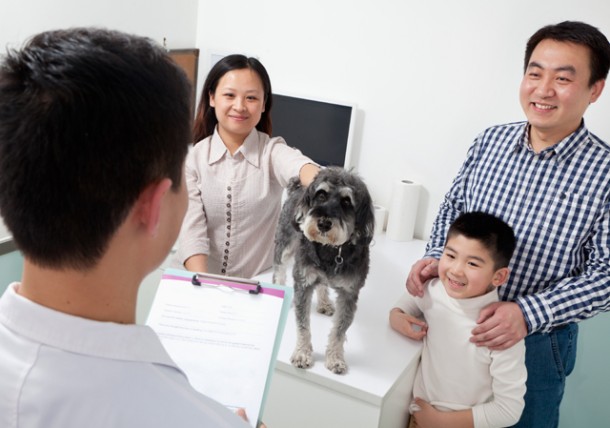Communicating with Your Veterinarian

Good client communication with your Texas veterinarian is an essential aspect of successful medical treatment for your pet. Because pets are unable to communicate their symptoms, it is important for pet owners to know how to communicate with their pet’s veterinarian and other veterinary professionals in order to serve as their pet’s advocate. Sometimes when a beloved pet is ill, an owner may understandably become frustrated when communicating with a veterinarian because he or she is stressed or scared. Other times, frustration can result from a simple miscommunication. From the perspective of a vet, here a few tips clients can use to ensure good communication with your pet’s veterinarian and staff at your next visit:
Consider the veterinarian’s point of view:
At some point in their pet’s care, many owners may be confronted with a vet who communicates in medical jargon and uses complicated terms to discuss the well-being of critters. It can be helpful to realize that some vets find it difficult to explain complex medical situations to pet owners. They are caught between wanting to communicate using simple language to ensure owners understand their pets’ conditions and not wanting to use such simplistic language as to insult the clients’ intelligence. In my personal experience, this does not happen often, but when it does, it can pose a world of problems for all involved.
One thing you can do to focus in this situation when communicating with the vet is to remember that your vet is a person too. For example, I feel very similar to the confused pet owner when dealing with an auto mechanic who is trying to fix my car. Sometimes communicating with an expert can be intimidating, frustrating and overwhelming. Remember that your veterinarian is trying to help you and has the knowledge to do so. In order to bridge the gap between your veterinarian’s expertise and your understanding of your pet’s situation, initiate communication in your pet’s treatment by asking questions.
Ask questions:
The best approach for the owner of any animal when visiting the vet is to come ready to ask questions, lots of questions. Sit down and write out a list of things you would like to talk about prior to your visit. If an aspect of your pet’s treatment plan doesn’t make sense to you, such as giving your pet a certain medication, ask why the instruction in question is part of your pet’s treatment. If there is anything you don’t understand during the visit, get clarification before you leave. By and large, veterinarians do not mind taking extra time to ensure that owners have a firm grasp on what is happening with their pets. If you feel that a veterinarian is not giving you a chance to ask questions, be forceful and ask anyway.
It’s important to realize that client-veterinarian communication is a two-way street. The need for the client to effectively communicate is just as important as the client gaining information from the vet. Make sure you give your veterinarian as much information about your pet as you can. While diagnostic testing is a tool for the vet to treat your pet, the veterinarian’s interpretation of the history provided by the client is often equally as important.
It’s during the communication and conversation between veterinarian and pet owner that some of the most important decisions are made regarding pets. Without good communication during a veterinary visit, owners could easily walk away without a full understanding of their pet’s health or treatment plan.
Remember the golden rule:
It is unavoidable that in some cases problems will arise and a client will feel less than satisfied after a visit to their pet’s vet. During times like these, remember that veterinarians are people too, often with their own pets, and mistakes can be made. When you communicate and take steps to have mistakes corrected, all vets can ask of you is that you treat us with the same respect you would appreciate if the situation was reversed. The great majority of veterinarians want nothing more than to make your pet feel better. If appropriately alerted to the fact that they did not succeed at that task, many will bend over backwards to make things right.
Tyler Foreman, DVM, is a graduate of Texas A&M College of Veterinary Medicine who lives in Dallas, Texas. Dr. Foreman practices at Rowlett Veterinary Clinic in Rowlett.


Knowledge is power, and your best decisions will be made if you have all the information you can get. So feel free to ask your veterinarian questions you have.
http://www.lacuevavet.com/